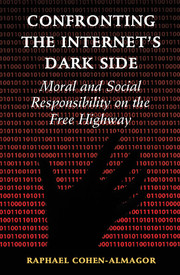Book contents
- Frontmatter
- Dedication
- Contents
- Acknowledgments
- List of Abbreviations
- Introduction
- 1 Historical Framework
- 2 Technological Framework
- 3 Theoretical Framework
- 4 Agent's Responsibility
- 5 Readers' Responsibility
- 6 Responsibility of Internet Service Providers and Web-Hosting Services, Part I: Rationale and Principles
- 7 Responsibility of Internet Service Providers and Web-Hosting Services, Part II: Applications
- 8 State Responsibility
- 9 International Responsibility
- Conclusion
- Glossary
- Selected Bibliography
- Index
4 - Agent's Responsibility
Published online by Cambridge University Press: 05 July 2015
- Frontmatter
- Dedication
- Contents
- Acknowledgments
- List of Abbreviations
- Introduction
- 1 Historical Framework
- 2 Technological Framework
- 3 Theoretical Framework
- 4 Agent's Responsibility
- 5 Readers' Responsibility
- 6 Responsibility of Internet Service Providers and Web-Hosting Services, Part I: Rationale and Principles
- 7 Responsibility of Internet Service Providers and Web-Hosting Services, Part II: Applications
- 8 State Responsibility
- 9 International Responsibility
- Conclusion
- Glossary
- Selected Bibliography
- Index
Summary
He will not enter Paradise whose neighbor is not secure from his wrongful conduct.
–Muhammad, Sahih Muslim, Hadith 15
Man is the only animal that blushes. Or needs to.
–Mark Twain
The Internet has created new markets and is profoundly changing the way people interact, express themselves, relax, find leisure, explore the world, and think about human phenomena. Made possible by technological advances in computer hardware, software, and telecommunications, the Internet age often allows people to have cyber lives in addition to their offline lives. The two are not necessarily the same.
The object of this chapter is to discuss moral and social responsibilities of Netcitizens. I first discuss the responsibility of people who are using the Internet, Netusers (or Net agents). I continue with a discussion of Juicy Campus and an analysis of the Megan Meier tragedy. The latter illustrates an immoral use of the Internet on social networking websites, abuse of the functions of the Internet without regard to the potential tragic consequences, and exhibition of behavior that is stripped of any sense of moral responsibility. In this context I also address parental responsibility. Finally, I warn against the phenomenon of cyberbullying.
In the physical world, the term bullying has tended to describe conduct that occurs when someone takes repeated action to exert control over another person. Traditional bullying is defined as intentional, continued physical, verbal, or psychological abuse or aggression used to reinforce an imbalance of power. It can involve tormenting, threatening, harassing, humiliating, embarrassing, or otherwise targeting a victim. The term cyberbullying generally refers to online abuses involving juveniles or students. Although in any given instance of cyberbullying, at least one of the parties may not be a youth, discussions about cyberbullying generally revolve around school-age children and often call on schools to address the issue. Studies from different countries have repeatedly demonstrated that cyberbullying is a persistent problem that affects children and youth of both genders.
- Type
- Chapter
- Information
- Confronting the Internet's Dark SideMoral and Social Responsibility on the Free Highway, pp. 84 - 114Publisher: Cambridge University PressPrint publication year: 2015



